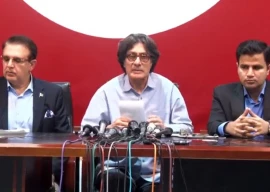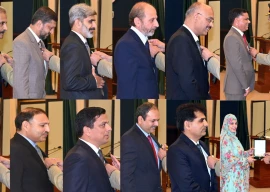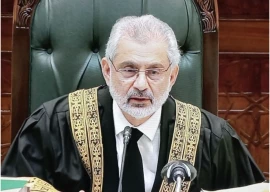
One reason may be because his father's murderer, a Muttahida Qaumi Movement (MQM) activist by the name of Saulat Mirza, has been on death row for years. But as a police officer, Hamid has other reasons as well. With a stay on death penalties, he feels there is no deterrence for criminals.
On Sunday evening, Hamid was speaking to a small audience at The Second Floor cafe, which had collaborated with The British Alumni Association of Pakistan to host an evening of readings and conversation on his first novel, 'The Prisoner'.
"The police have no alternative but to engage in encounters," he says, before clarifying that he does not support extra-judicial killings. "What choice do [policemen] have? If the police go to arrest criminals and militants who will not think twice before killing them, we won't throw flowers at them."
Contrary to his powerful book based on the kidnapping of a foreign journalist, which hits out at the dishonesty of the police force from the lowest to the highest level and boldly mocks the militant wing of a political party and their control over the city, Hamid appears far from being a crusader. Hamid is not our typical police officer. He can speak English fluently, doesn't have the arrogance of a high-ranking policeman, and seems more comfortable with a pen than with a gun.
"I've been posted in all the lousy areas, SITE, Orangi, Saudabad, Lyari, Civil Lines, Clifton…," he says, smiling when the moderator interrupts. "Clifton is lousy?" she asks.
Hamid has been on leave from the police department for the past three years. Before then, he served the force for 12 years, working closely with Chaudhry Aslam in the Crime Investigation Department (CID).
Clad in a white kameez shalwar with a gleaming watch on his right hand, Hamid talks about the time when the two were wounded in 2005, when they went to Hub to find Rehman Dakait.
"It was a badly planned raid," he admits. "My next book can be on how not to plan a raid." Hamid's team had their men hidden in dumper trucks. It initially seemed to be a very fine idea, says Hamid, but it was stupid to enter the area at 3am without headlights on.
On Chaudhry Aslam
The police officer says that Aslam's death was unfortunately something which they expected. A lot of police officers were killed in the line of duty and had been getting threats. "Aslam's killing was important for the TTP. He was far from perfect but his killing had a huge impact."
On the police
The officer is disappointed at the rising number of killings within the police force. Anywhere else in the world, the murder of a police officer is taken very seriously, he says, adding that it is not given much importance here, even by the police. "The number of police officers killed in Karachi is the highest in the world as compared to other violent cities."
According to him, the police department is a flawed organisation but is facing challenging conditions in Karachi. On the recently planned attack on Karachi Central Jail, which is incidentally discussed in depth in his book, Hamid supports the idea of isolated, high-security prisons. Jailers are more exposed than police officers, he adds.
On the book
Around 80 to 90 per cent of 'The Prisoner' is based on real-life experiences, Hamid says, adding that he did not necessarily experience all of them. "I wasn't in the police when Murtaza Bhutto was killed," he points out an example.
Hamid says Constantine, the main character in his novel, is the only one who is not based on a real-life person. His name is inspired from Kenson Dean, a police officer who is still part of the force. "I thought it would be interesting to write from the perspective of a Christian officer," he says. The writer has finished work on his second novel, a crime-thriller by the name of 'The Spinner's Tale', which is expected to hit the bookstores by March or April next year. His second novel deals with the growth of extremism in the country.
On militancy
"Karachi is virtually an ATM machine for Jihadi movements," says Hamid. He is not shy to reveal that the TTP, at one time, was working with people who were involved in kidnappings and bank robberies. Troubles began, however, when the interests of the individuals took over the interests of the organisations, he says.
Published in The Express Tribune, October 21st, 2014.





































COMMENTS
Comments are moderated and generally will be posted if they are on-topic and not abusive.
For more information, please see our Comments FAQ